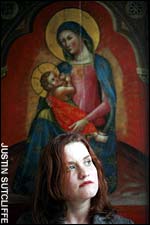Townhall.com Dennis Prager
When my older son was about 8 years old, I was putting him to bed one night and asked him what he learned that day in school. Normally he would answer, as nearly all boys do, by saying, “Nothing.” But that night he had an answer.
“I learned I have a yetzer hara,” he told me. As a student at a religious Jewish school, he was using the Hebrew term for the desire to do what is wrong. It is basic Jewish theology that the human being has two innate drives — one for good and one for bad — and that life is a constant battle with the bad drive. While Christian theology uses different terms, such as “sinful nature,” both traditions believe that the greatest battle for a better world is usually with oneself.
This is another significant way in which the Judeo-Christian value system differs from the dominant value system — that of the Left — in the contemporary West. Whether the ideology calls itself radical, leftist or liberal, its primary emphasis is on “social justice,” i.e., making society more just. Now, of course, Judeo-Christian values also seek to create a just society. Any system rooted in the Old Testament prophets and teachings of Jesus is going to be preoccupied with how to make a just society.
The differences lie elsewhere. There are two major ones.
The first is that the Left frequently defines “social justice” differently than Judeo-Christian values do. For most on the Left, “social justice” means social equality and social fairness. It is not fair that some people have more than others. This is why the Left believes that courts should be far more than umpires when adjudicating justice: they should be promoting fairness and equality.
The other difference, the focus of this column, is that leftist ideologies are so preoccupied with “social justice” that they generally ignore personal character development.
Judeo-Christian values believe the road to a just society is paved by individual character development; the Left believes it is paved with action on a macro level.
That is one reason the Left is far more interested than the Right, i.e., religious Jews and Christians and secular conservatives, in passing laws, whether through legislation or through the actions of judges. That is how the Left believes you make a better society. There is, incidentally, a second reason the Left passes so many laws: As the Left breaks down the self-discipline of Judeo-Christian religions, more and more laws are needed simply to keep people from devouring each other.
That the Left is more concerned with social change than individual change and the Right is more concerned with individual than social activism can be seen in many areas.
Many parents, for example, measure their child’s character by the child’s social activism, not by his or her behavior toward fellow students. If the child has walked for AIDS, or marched for breast cancer, or works on “environmental issues,” the child is deemed — and the child deems himself — a fine person. That he or she might mistreat less popular kids in class is not considered.
There are, of course, religious Jews and Christians who do not lead decent lives and there are leftists who do. But leftist ideals, being overwhelmingly macro, will always be more appealing to the less decent who want to feel good about themselves. That helps explain those Hollywood celebrities who lead narcissistic, hedonistic personal lives but nevertheless feel very good about themselves by raising money for “peace” or by demonstrating against global warming.
I first became aware of this vast discrepancy between “social activism” and personal ethical behavior when I saw the personal behavior of the “pro-peace,” anti-war, activists at my graduate school (Columbia University) in the early 1970s. They demonstrated for world peace but led personally narcissistic lives. Their theoretical altruism was all macro. Meanwhile, most of the religious students were preoccupied with personal character issues.
Why? Because Judeo-Christian values have always understood that the world is made better by making people better. On occasion, of course, a great moral cause must be joined. For example, it was religious Christians who led the fight to abolish slavery in Europe and America. But in general, the way to a better society is through the laborious and completely non-glamorous project of making each person more honest, more courageous, more decent, more likely to commit to another person in marriage, more likely to devote more time to raising children, and so on.
That is why all those peace studies institutes and courses are morally meaningless. Only by people learning to fight their yetzer hara will peace reign on earth.

